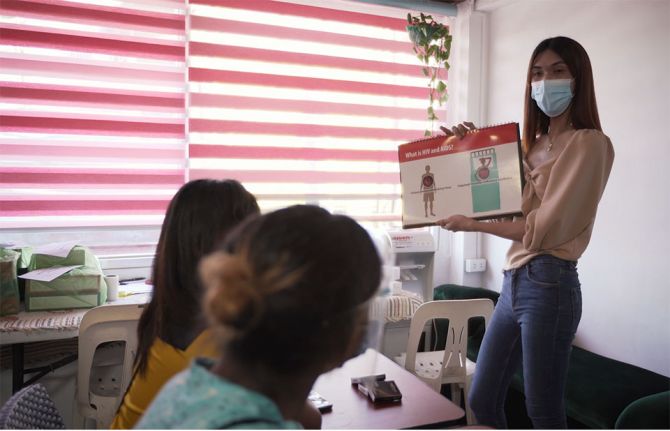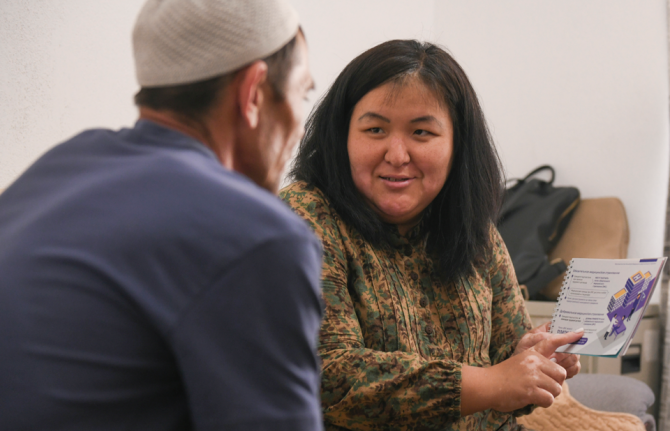
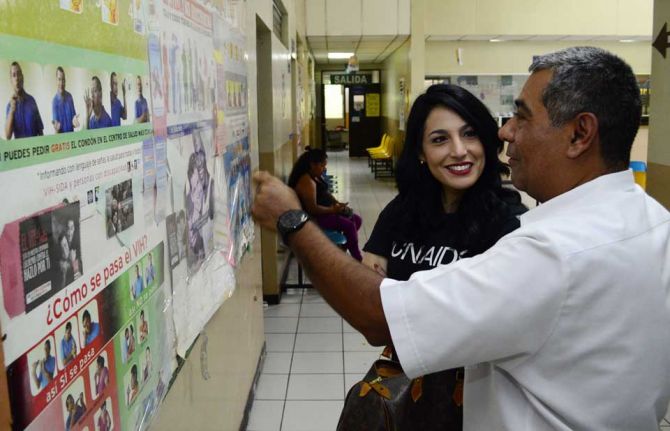
Update
Promoting HIV prevention among young people in El Salvador
16 August 2017
16 August 2017 16 August 2017UNAIDS Regional Goodwill Ambassador for Latin America and the Caribbean and CNN Anchor Alejandra Oraa visited El Salvador from 9 to 11 August to raise awareness about strengthening HIV prevention efforts for adolescents and young people.
In El Salvador, there is a growing concern about the increase in new HIV infections reported since 2011 among adolescents aged between 15 and 19 years. Young people are not receiving the information they need to protect themselves from HIV: only 36.5% of young people aged 15–24 years know how to prevent HIV transmission.
During her visit, Ms Oraa met with youth leaders in order to analyse gaps in access by adolescents and young people to sexual and reproductive health and HIV-related services and comprehensive sexuality education. Young people stressed the need to urgently accelerate efforts to provide youth with the tools they need to make informed decisions to protect their health, rights and dignity.
Young people also talked about the initiatives in place to contribute to the HIV response from their perspective. For example, to improve access to information and education on HIV and sexual and reproductive health, the National Network of Positive Youth, in coordination with UNAIDS, the United Nations Population Fund and the National Youth Institute, organizes outreach awareness initiatives in public places and schools. Between Friends (Entre Amigos), a community-based organization, uses face-to-face approaches and offers combination prevention options for key populations, including young men who have sex with men and young transgender people.
In El Salvador, Ms Oraa leveraged her social media power to launch a new online survey to assess young people’s knowledge about HIV prevention and transmission. The findings of that United Nations Children’s Fund and UNAIDS joint initiative will be used to inform national public policies and strategies to prevent and reduce new HIV infections among young people.
Quotes
“No one can tell a father or a mother to talk or not to talk about sex with their children; this is their decision. However, a state should guarantee comprehensive sexuality education. If the state prepares a child to go out into the world knowing maths and literature, spelling and science, why not prepare him or her for something as important as his or her sexuality? It is not about teaching them to have sexual relationships, it is a matter of explaining what it implies, what are the risks and the consequences.”
“To end the AIDS epidemic by 2030, we cannot fail our young people and we cannot leave any of them behind. It is urgent to remove all barriers that limit their access to sexual and reproductive health and HIV services.”
Region/country
Related

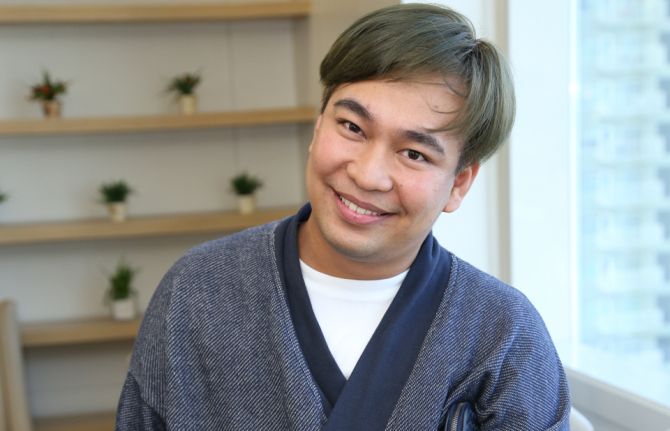
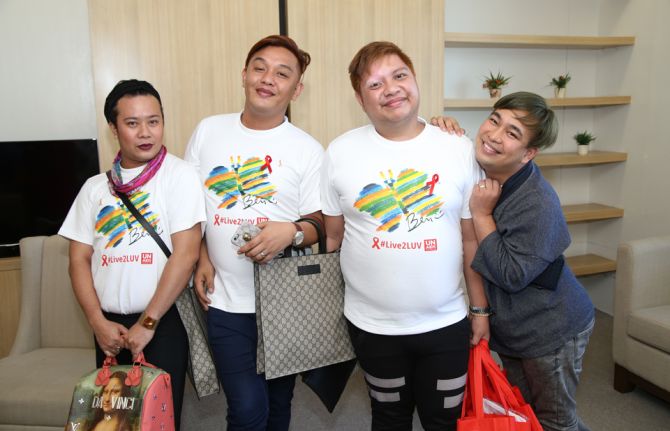

Update
Grassroots hero: thinking out of the box by mixing health and fun
15 August 2017
15 August 2017 15 August 2017There is a quiet hum in the room from the mostly young men sitting in chairs, eyeing their smartphones and chatting. Suddenly, a cheerful figure bursts into the executive lounge of the high-rise building in Taguig City, Philippines.
“Thank you, thank you,” said Ronivin (Vinn) Garcia Pagtakhan, the Executive Director and Founder of LoveYourself, a community-based organization providing health and empowerment services to men who have sex with men and transgender people. The team were wrapping up after a major event promoting HIV testing.
Mr Pagtakhan, with his shock of brown hair, frosted with a light green tint, bounced from one group to the next, joking and repeating his thanks.
Almost everyone here is a volunteer,” explained Mr Pagtakhan. “I get really moved when I talk about my volunteers. I owe everything to them.”
LoveYourself provides HIV testing and treatment services, as well as oral pre-exposure prophylaxis (PrEP) and tuberculosis screening. It has 25 staff members, who are supported by around 800 volunteers. Mr Pagtakhan founded LoveYourself in 2011, modelling it on a lesbian, gay, bisexual and transgender youth centre he volunteered in while living in San Francisco, United States of America.
“At the time, I felt there was a real problem with the way we were handling HIV prevention among the gay community in the Philippines,” said Mr Pagtakhan. “It was all about fear. I wanted something more optimistic and encouraging. I wanted a place that was lively, where people would want to hang out.”
He was only 25 years old at the time. “As they say, I know my market, because I am part of the community.”
He graduated from nursing school in the Philippines when he was 18 and got the fourth highest score on the national nursing board examinations. “This meant that I was in high demand by other candidates as a teacher helping to prepare people for their licensing exams. I travelled around the Philippines giving classes and I used social media to reach out to students as well,” said Mr Pagtakhan.
He became a celebrity on social media, with 600 000 followers on Twitter, and won the prestigious international Twitter Shorty Awards as the Nurse of the Year. The prize money helped start LoveYourself.
“The first three years, it was like sending your child off to college. I basically supported the organization on my earnings. We didn’t have any donors,” said Mr Pagtakhan. “I like to think out of the box and I had a particular vision. I didn’t want grants to dictate what we did or became. I wanted to create ripples of positive change in the community. LoveYourself isn’t just about HIV, but rather about increasing a person’s self-worth.
The organization has three community centres in the Manila, Philippines, area offering HIV testing and other services. Anyone can drop in, even on the weekends and in the evenings, for free health services.
LoveYourself tested about 20 000 people in 2016 and diagnosed around 1500 new HIV infcetions, which represent around 50% of the newly diagnosed HIV cases reported by the Department of Health in Manila. LoveYourself also works with companies and schools to help them develop HIV policies and to conduct on-site HIV tests.
In July, the organization began piloting PrEP and with support from UNAIDS and the World Health Organization plans to start a demonstration project offering self-testing before the end of the year.
In just six years, LoveYourself has grown to become an important HIV service provider in Manila. Mr Pagtakhan is proud of the organization’s achievements and has bigger ambitions. “We are still renting. I want LoveYourself to own a place, which is a community centre, where we can have health services but also original events and activities,” he said.
For more information on LoveYourself, go to http://www.loveyourself.ph.
Resoures
Region/country

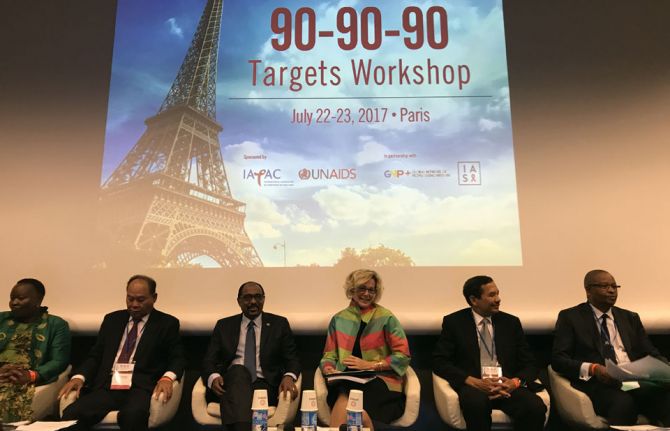
Update
Leading scientists celebrate progress towards 90-90-90 targets
25 July 2017
25 July 2017 25 July 2017Hundreds of the world’s leading HIV researchers, programme planners and implementers and civil society advocates gathered prior to the 2017 IAS Conference on HIV Science to assess progress towards the 90-90-90 targets. The workshop, sponsored by the International Association of Providers of AIDS Care (IAPAC) and UNAIDS, in partnership with the Global Network of People Living with HIV, focused on the latest data on progress and on new opportunities to continue to speed gains towards the 90-90-90 milestones.
The targets were launched by UNAIDS in 2014 to accelerate progress so that, by 2020, 90% of all people living with HIV know their HIV status, 90% of all people with diagnosed HIV are accessing sustained antiretroviral therapy and 90% of all people accessing antiretroviral therapy are virally suppressed. In 2016, for the first time, more than two-thirds of people living with HIV knew their HIV status and more than half of all people living with HIV had access to antiretroviral therapy.
Celebrating the marked advances made towards each of the three 90s, attendees agreed that attainment of 90-90-90 and ultimate control of the epidemic are achievable. New evidence of sharp declines in HIV incidence in numerous countries in eastern and southern Africa demonstrates that HIV treatment scale-up is not only reducing AIDS-related deaths but also contributing to epidemic control.
Following a keynote address by UNAIDS Executive Director Michel Sidibé, the workshop began with a dialogue between health ministers and senior ministerial officials from Botswana, Cambodia, Lesotho and Panama and global health leaders. This political session highlighted examples of how numerous countries are translating strong political commitment on AIDS into achievement of the 90-90-90 target.
Workshop sessions focused on areas where the push for 90-90-90 is falling short, on populations that are being left behind, and on potentially transformative opportunities to close these gaps. With the greatest gap across the HIV treatment cascade occurring at the first 90, participants called for an HIV testing revolution, including initiatives to nest HIV testing with screening programmes for other health conditions. Workshop presentations also underscored the importance of rapid roll-out of HIV self-testing.
To attain 90-90-90, it is clear that services must be expanded beyond health facilities and brought closer to the communities that need them. This conclusion was buttressed by findings from the SEARCH and PopART trials, which employed community-centred approaches to generate rapid progress towards the 90-90-90 targets. To enable the rapid scale-up of community-based services, African Union Heads of State this month enthusiastically endorsed a new regional initiative to recruit, train and deploy 2 million community health workers.
Multiple workshop sessions focused on challenges in reaching populations that are being left behind, including men, adolescent girls and young women, and such key populations as gay men and other men who have sex with men, people who inject drugs, sex workers and transgender people. Data presentations on diverse national and local experiences highlighted various strategies to close testing and treatment gaps among these groups, including service delivery strategies tailored to these groups, investment in communities, and strategies to minimize stigma and discrimination, including law and policy reform.
New resources will be needed to Fast-Track the global AIDS response, as amounts available for HIV programmes are roughly 25% short of the resource target for the Fast-Track response. According to modelling data presented at the workshop, South Africa could save US$3 billion and avert 1 million AIDS-related deaths by front-loading investments to reach 90-90-90, compared to continuation of the current pace of scale-up.
Quotes
“Three words characterize Botswana’s response to HIV – clear, bold and driven. This approach mobilized essential investments and generated tangible results [including achievement of the 90-90-90 targets].”
“Cambodia is on track to achieve the 90-90-90 targets. Cambodia’s response to AIDS began in the early 1990s, when the country faced a generalized, fast-growing epidemic. Today, we are focusing on priority populations and aim to eliminate new HIV infections by 2025.”
“AIDS has taken a results-driven approach. That is why I have long championed bold goals and targets for AIDS. The latest data demonstrate that 90-90-90 is not a dream. In the face of skepticism, we have clearly proven that we can achieve 90-90-90. In moving forward, we must pay attention adolescent girls and young women, bring young men into services, and reach vulnerable communities, as key populations account for 80% of new HIV infections outside sub-Saharan Africa.”
“It is not always easy for communities to make a sharp pivot in their approaches, but we have successfully pivoted towards the 90-90-90 target. The latest results for the HIV treatment cascade – 70-77-82 – are inspiring. To attain epidemic control, we will ultimately need to achieve 95-95-95, which will happen only if we focus on people.”
“The ability of communities to respond and political commitment to face and overcome key challenges have together served as the linchpin of the progress we have made towards 90-90-90. National governments rapidly changed their policy approach to implement a test-and-treat approach, and we have invested in the collection and use of granular data at the site level to drive and inform our efforts.”
Related

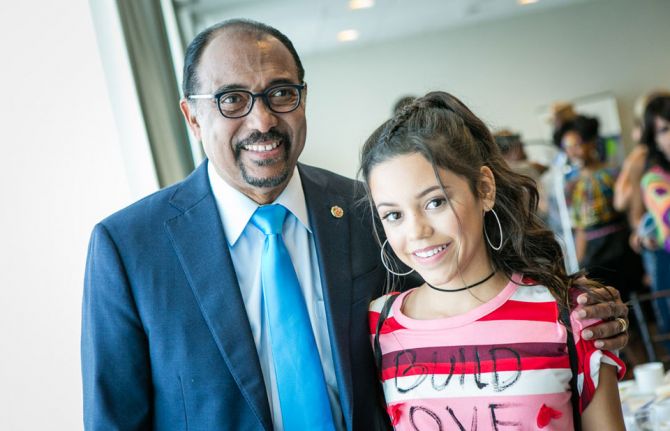
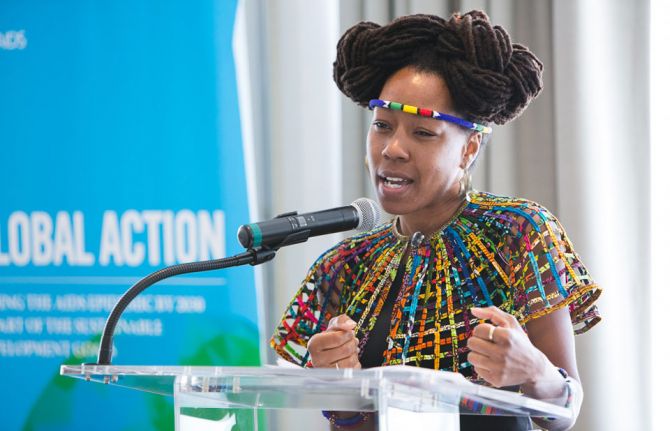
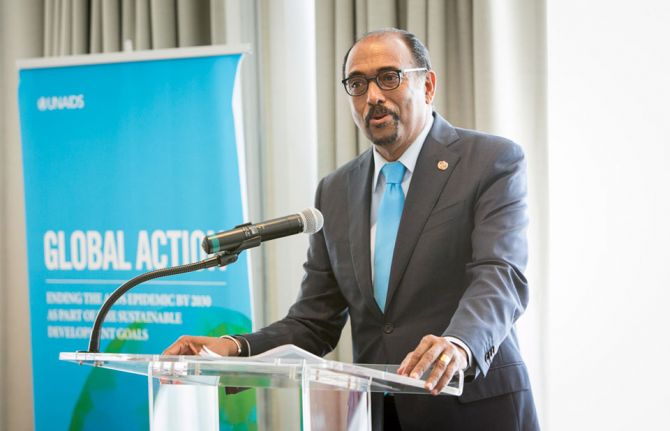
Update
Inclusion of communities in decision making crucial to achieving Agenda 2030
19 July 2017
19 July 2017 19 July 2017Empowerment and meaningful participation of communities most affected by sustainable development issues is fundamental to reaching global health, development, rights, and gender goals - including ending AIDS by 2030. This message was emphasized by global development partners at the Leaving No-One Behind in Decision-making: Setting the Example in the Sustainable Development Goal (SDG) Era event held on 18 July - Nelson Mandela Day - during the UN High-Level Political Forum in New York.
Hosted by UNAIDS, the UNAIDS PCB NGO delegation, the Government of Botswana and the Government of Portugal, the event began with keynote speeches from Musah Lumumbah,
Ugandan youth advocate and UNAIDS PCB NGO delegate and Jenna Ortega, actress and activist. Panel members Slumber Tsogwane, Botswana Minister of Local Government and Rural Development, François Delattre, Ambassador of France to the United Nations in New York, Alessandra Nilo Gestos, Brazil and UNAIDS PCB NGO delegate and Michel Sidibé, UNAIDS Executive Director were led by facilitator Ebony Johnson, gender and community mobilization advocate, through a dynamic discussion. The session considered lessons learned from the AIDS response, where multisectoral, multistakeholder partnerships and community mobilization, leadership and inclusion has been critical to progress, and how to consolidate these types of inclusive partnerships to help drive impact across the SDGs.
Interventions focused on examples of how and where meaningful community involvement in the planning, programme development, decision making and implementation within the AIDS response not only empowers the voice of those most affected but is also more effective in ensuring the most appropriate policy and planning, tailored to realities and needs.
The session emphasized how inclusion of community representatives in governance processes, at country, regional and global levels, is a powerful mechanism to foster solutions with impact. UNAIDS’ inclusive governance model, where civil society are members of the Programme Coordinating Board, was highlighted as a unique example of how United Nations governance systems can take forward the SDGs in a way which is accountable to and owned by ‘the peoples’ it serves, and which truly leaves no one behind.
Quotes
“It is timely to have the meeting today on Nelson Mandela Day. He was truly convinced that you will never win without opening the door, being inclusive, creating a democratic space. This only effective way to reach the SDGs will be through a multisectoral approach, with communities fully and meaningfully involved, as we have been doing in the AIDS response.”
“Empowerment is critically important because young people’s voices need to be heard. Young people should be able to influence policies and practices that affect our health. Young people are creative and inspiring and would often come up with creative ideas--we can be the generation to end AIDS.”
“When the first HIV cases were reported in Botswana we did not have the infrastructure in place to deal with this epidemic. We had to work in partnerships to be able to address the impact of the epidemic.We know what can work, and now our response to HIV aligns with the SDGs and the national vision for the country’s future.”
“As we take stock of the SDGs we shall continue, as communities, to fight discriminatory laws, discrimination and stigma and to advance the notion of positive health and dignity. We can’t realize the targets in the SDG agenda if communities are isolated. The UNAIDS governing body is the only one in the United Nations system with civil society on the Board - we call for this to be expanded, we call upon United Nations system, member states and stakeholders to support communities at all levels.”
"The HIV response has been marked by the participation of NGOs and this has been instrumental to making sure programmes reached the right people, mobilized populations and generated funding mechanisms. France will continue to promote civil society involvement in decision making as well as in development and HIV programmes.”
Related

Update
Fast-Track Cities share 90-90-90 progress
26 July 2017
26 July 2017 26 July 2017Health department representatives from Amsterdam, Nairobi, Paris, San Francisco and São Paulo gathered during a Fast-Track Cities Symposium at the 2017 International AIDS Conference on HIV Science in Paris. They shared their lessons learned and challenges in preventing new HIV infections and addressing barriers to health.
Amsterdam is among the first cities to have reached the 90-90-90 targets whereby 90% of people living with HIV know their HIV status, 90% of people diagnosed are on treatment, and 90% of people on treatment are virally suppressed.
Many other cities like Paris are on the right track and have mobilized political commitment for the Fast-Track Cities agenda. With support from the core partners of the Fast-Track Cities network, including UNAIDS, International Association of Providers of AIDS Care, the City of Paris and UN Habitat, cities are adopting innovative approaches to reach affected populations, to optimize linkages to HIV treatment and care, and to address different gaps according to the cities.
Early HIV diagnosis has boosted early treatment uptake as has using strategic data to improve various HIV programmes. The cities of Bangkok, Nairobi and New Orleans launched city dashboards at the conference, illustrating significant progress. Baseline 90-90-90 data published include 79-57-79 for Bangkok, 77-96-86 for Nairobi, and 87-69-91 for New Orleans. Additional data presented at the afternoon session showed 87-65-91 for São Paulo, 93-79-91 for San Francisco and 94-90-94 for Amsterdam.
Since the 2014 launch of the Paris Declaration—Fast-Track Cities: Ending the AIDS Epidemic—more than 200 cities and municipalities around the world have committed to the achieving the 90-90-90 targets by 2020. Almaty in Kazakhstan was the latest city to sign the declaration on 20 July 2017.
Quotes
“Fast-Track Cities are working together to demonstrate they are a model to follow. We have a window of opportunity to act fast and break the backbone of the HIV epidemic.”
“We are close to joining the 90-90-90 club but our main challenge is getting people to get tested for HIV. We need to prioritize key affected populations and get the right messages across, in Paris that means more awareness among men who have sex with men and migrants.”
“90-90-90 is not sufficient to stop ongoing transmission. The last mile to zero new infections and our biggest challenge remains reaching hard to reach populations.”
“In Fast-Track Cities around the world we are witnessing data-driven acceleration of municipal AIDS strategies in partnership with local stakeholders, notably affected communities.”
Related

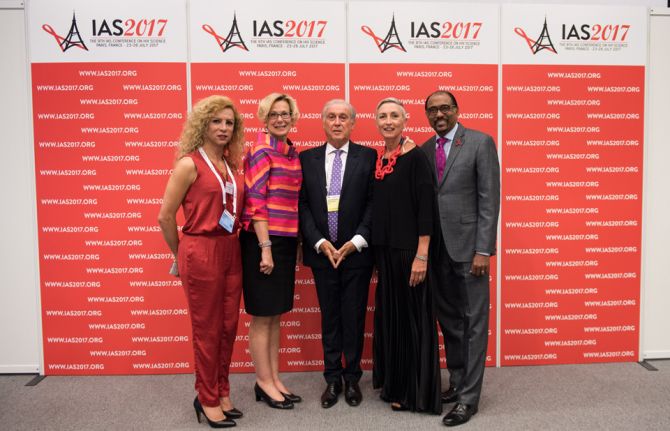
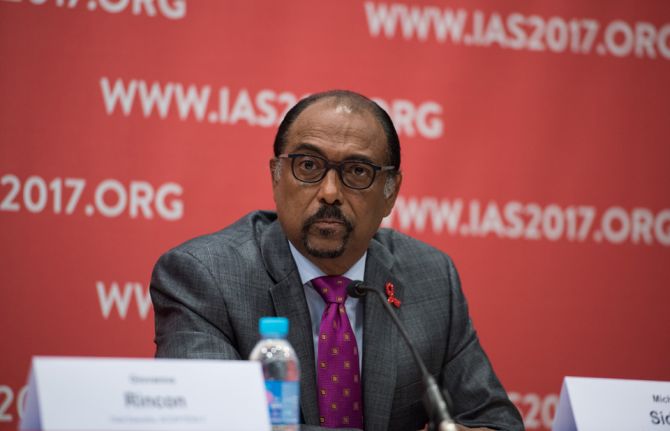
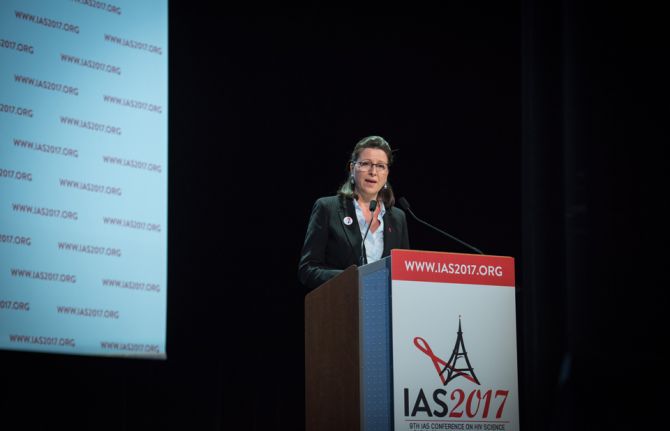
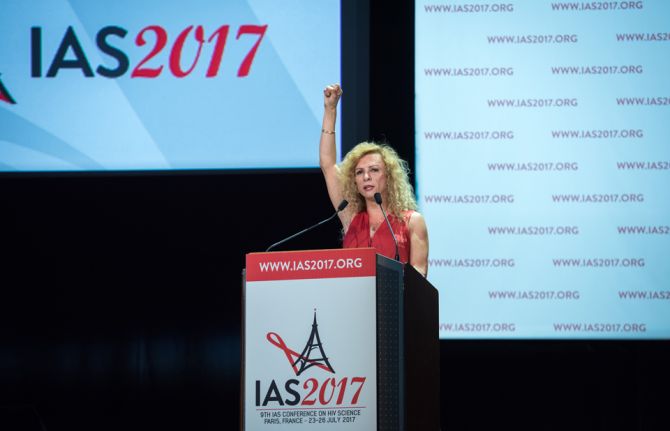
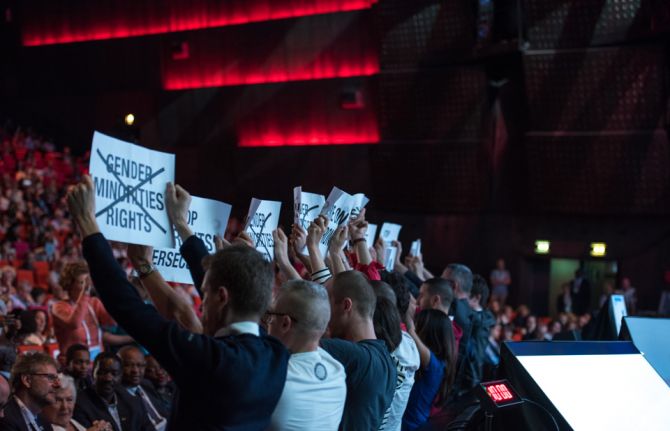
Update
9th AIDS conference on science opens in Paris
24 July 2017
24 July 2017 24 July 2017More than 6 000 HIV professionals from around the world have gathered in Paris for the 9th IAS Conference on HIV Science. The four-day conference is one of the largest open scientific meetings on HIV, organized by the International AIDS Society (IAS) in partnership with the French National Agency for Research on AIDS and Viral Hepatitis (ANRS).
This year’s conference will prioritize basic science, a prerequisite step to ending the HIV epidemic and feature studies that shine a light on the specific needs of key populations, including young people, transgender people, men who have sex with men, sex workers and people who inject drugs.
The conference was officially opened on Sunday evening by French Health Minister Agnes Buzyn, UNAIDS Executive Director Michel Sidibé, French economist Esther Duflo, Giovanna Rincon, President of the ACCEPTESS-T association and officiated by Linda-Gail Bekker, President of IAS and International Scientific Chair of IAS 2017 as well as IAS 2017 Local Scientific Chair and former director of ANRS.
Global HIV funding has many preoccupied at the Paris conference. Funding cuts would devastate HIV research and treatment programmes, stalling or undoing recent progress highlighted in the latest UNAIDS report released 20 July. IAS reiterated that their shared objective was to ensure that science remains the backbone of the global AIDS response saying funding was critical to end the HIV epidemic.
The conference runs from 23 July to the 26th.
Quotes
"Without civil society, without science and innovation, we would be far away from where we are today in the AIDS response. It is now or never, we have to seize the window of opportunity to end the AIDS epidemic.”
“Thanks to research and collective efforts we are inching closer to an end to the epidemic but aside from research, let us not underestimate that prevention is key. Prevention must be strengthened especially among young people.”
“Social science matters in broadening the toolkit in the fight against HIV. Tremendous progress has been made but collectively we are stalling because not enough attention is being paid on the ground.”
“While HIV research has already delivered major advances that have saved millions of lives, we still have much more to know and discover, especially a vaccine and a cure.”
“Each study opens new doors, closes others and narrows our focus. The collective power of the cutting-edge research that will be presented at IAS 2017 will take us a giant step forward in getting to the end of HIV.”
“Science will allow us to find an eventual end to HIV but until then do not forget our quality of life and our access to health.”
Resources
Related

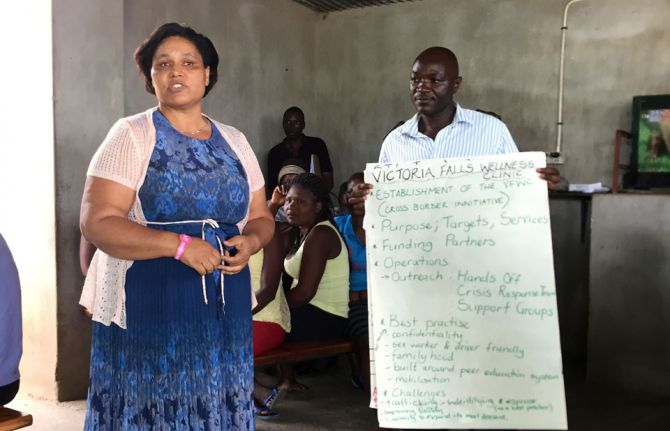
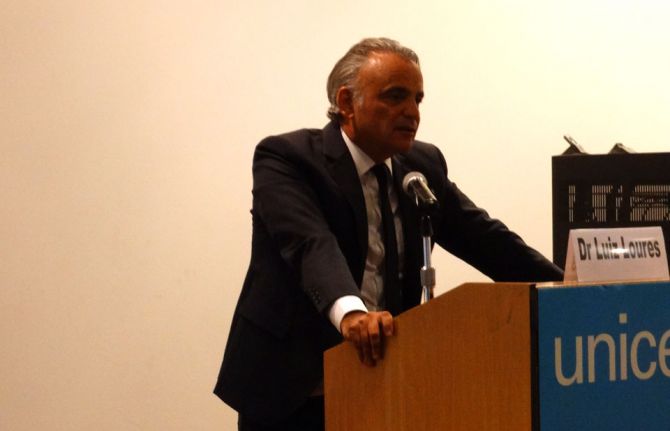
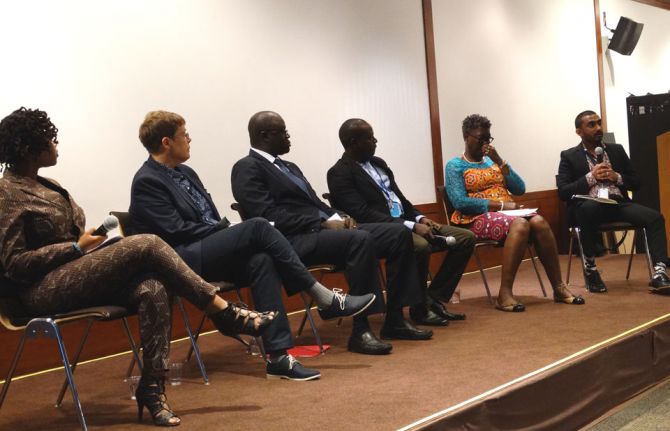
Update
Communities achieving the SDGs by providing people-centered services to all
18 July 2017
18 July 2017 18 July 2017Civil society, United Nations agencies, government representatives and development agencies gathered to discuss the critical role of communities in achieving the Sustainable Development Goals (SDGs) at the Community Actors Speak Out: the Role of Community Action in Delivering the SDGs event in New York on 17 July 2017 on the side-lines of the 2017 High-Level Political Forum in New York
Luiz Loures, Deputy Executive Director of UNAIDS, joined leading members of civil society, the Dutch Minister of Foreign Trade and Development Cooperation, Lilianne Ploumen, the Danish Minister of Finance, Kristian Jensen, and Romain Schneider, Luxembourg Minister for Development Cooperation and Humanitarian Action to discuss how the AIDS response has demonstrated the need to address structural, social and economic factors of vulnerability in order to make progress. Mr Loures, highlighted how decades of experience in the global AIDS response demonstrated how communities affected by HIV have been leading the delivery of people-centred services, addressing the holistic health care needs for their members, beyond HIV.
Members of the panel Alasan Senghore, International Federation of Red Cross and Red Crescent Societies, Dorothy Onyango, Women Fighting AIDS in Kenya and Niluka Pereira, Youth Voices Count, Sri Lanka reiterated the centrality of community in making progress in the SDGs. Community action has to be meaningfully and systematically integrated into global and national development and health strategies, implementation and financing plans, including universal health coverage strategies, and in the overall 2030 Agenda for Sustainable Development.
The dialogue was organised by the International HIV/AIDS Alliance, Aidsfonds, UNAIDS, the International Federation of the Red Cross and Red Crescent Societies, Aids-Fondet, and the Free Space Process in collaboration with the governments of the Netherlands and Luxembourg.
Quotes
“Community has the capacity to engage meaningfully, and commitments to engagement need to be monitored. Communities need to be meaningfully engaged in the SDGs so that they inherit the future that is made with them and not for them.”
“Women are left to be volunteers. We cannot be volunteers forever. Let us strengthen the networks of Women living with HIV. Our voices must be heard.”
“Access is a challenge not only for health emergencies. The only answer to [effectively] deal with health and humanitarian crises is through community engagement, empowering them and giving them the resources they need.”
“Historically the prime movement responding to AIDS was in the hands of civil society. Political commitment, funding, and scientific development are thanks to activism. Community action can be the pathfinder to achieve the SDGs. The critical point now is how to make sure that this pathfinder effect is taken forward by political leadership.”
“In the Netherlands government and civil society has a tradition of working together. They have been the key change agents and our partners. Without them the Dutch government would have never been as effective at the national, and also international level.”
“Efficient implementation of SDGs requires adequate investments for community actions, both by international donors and governments.”

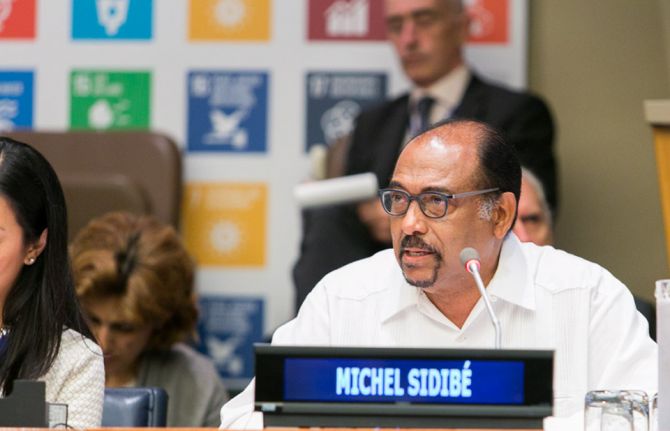
Update
AIDS is the pathfinder for the SDGs
14 July 2017
14 July 2017 14 July 2017“Eradicating poverty and promoting prosperity in a changing world” is the theme of the 2017 United Nations High-Level Political Forum review of the 2030 Agenda for Sustainable Development and progress towards the Sustainable Development Goals (SDGs), which is taking place in New York, United States of America, from 10 to 19 July.
The 2017 High-Level Political Forum is undertaking an in-depth review of the SDGs on poverty (SDG 1), hunger (SDG 2), health (SDG 3), gender equality (SDG 5), infrastructure and innovation (SDG 9), oceans (SDG 14) and means of implementation and global partnership for sustainable development (SDG 17).
The 2030 Agenda for Sustainable Development takes to scale what the AIDS response has been working towards for 30 years—a multisectoral, rights-based, people-centred approach that addresses the determinants of health and well-being. Speaking at the Leveraging Interlinkages for Effective Implementation of the SDGs panel, Michel Sidibé, the UNAIDS Executive Director, shared the experiences and lessons learned from the AIDS response, as well as from the work of UNAIDS, in addressing the many intersections between the AIDS epidemic and other health, human rights and broader development issues as a pathfinder to help achieve the SDGs.
Quotes
“The integrated, indivisible and interlinked nature of the Sustainable Development Goals requires an in-depth discussion of the interconnection between the various goals and targets. There is a large body of analytical research and evidence from many different sources, supporting integrated policy-making, implementation and monitoring.”
“No one sector can achieve the Sustainable Development Goals agenda alone—together we are strong. The AIDS response has years of people-centred experience to share to advance our commitment to the 2030 Agenda for Sustainable Development.”
Related

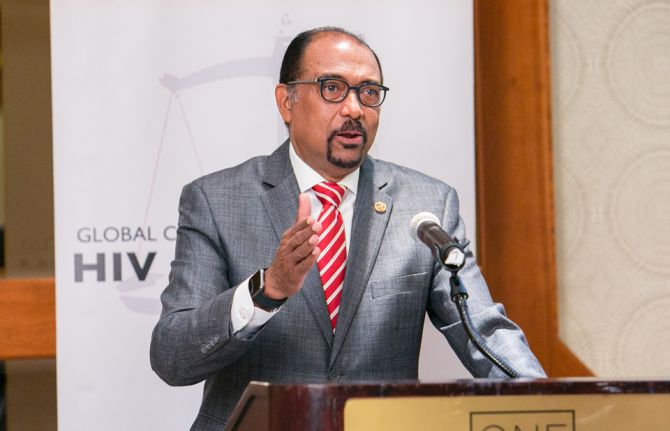
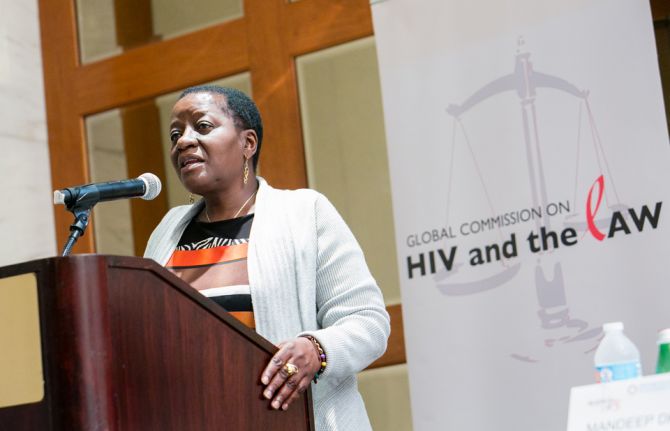
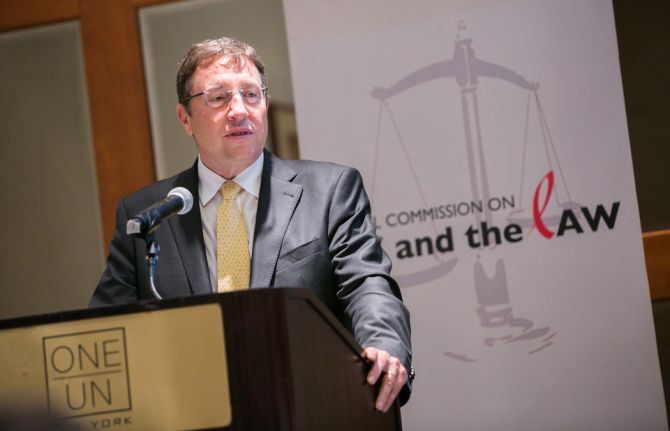
Update
Review of Global Commission on HIV and the Law identifies progress and challenges
14 July 2017
14 July 2017 14 July 2017Five years ago, a landmark report published by the Global Commission on HIV and the Law urged governments to promote laws and policies grounded in evidence and human rights in order to turn the tide against AIDS. On 12 and 13 July, members of the commission and other experts came together to assess the progress made in advancing the report’s recommendations, look at the barriers that remain and discuss opportunities for further progress.
The participants recognized the role of the commission as a catalyst for social justice and human rights in the HIV response. Since the release of the commission’s report in 2012, efforts to advance the report’s recommendations have been documented in 88 countries. Several countries have conducted comprehensive assessments of laws, policies and practices affecting people living with HIV and have changed legislation as a result. National conversations on the rights of people living with and vulnerable to HIV have led countries to reform discriminatory practices against people living with HIV. Judges, civil society organizations and partners have been instrumental in helping to overturn discriminatory legislation and counter HIV stigma.
Despite this progress, persistent and new forms of human rights challenges face the HIV epidemic and response. Shrinking space for civil society, reduced funding for human rights, discrimination in health-care settings and an increasingly challenging political and social space are among the challenges that call for continued action. In the light of this, the participants called for an update report of the Global Commission on HIV and the Law to reinvigorate progress in advancing human rights and ensuring that no one is left behind.
Quotes
“Laws that criminalize HIV are anti-science, unjust and unconstructive.”
“We’ve seen that some countries, including Ghana and Mozambique, have been able to improve HIV responses by adopting more progressive policies. If we’re going to defeat HIV, other countries need to do the same.”
“Equality, inclusion and non-discrimination are at the heart of the 2030 Agenda for Sustainable Development. Laws and policies that protect rather than punish, combined with programmes that reduce stigma and discrimination, exist and need to be scaled up if we are to achieve our goal of ending the AIDS epidemic by 2030.”
“It’s incredible to see the progress that some countries have made over the past five years. They’ve taken important strides to protect the rights of women and people living with and vulnerable to HIV. But now is also the time to think of the way forward in addressing the persistent and new challenges that are leading to people being left behind in the response to HIV”.
Related


Update
More people living with HIV in Kyiv accessing antiretroviral therapy
13 July 2017
13 July 2017 13 July 2017A public–private partnership between the Elena Pinchuk ANTIAIDS Foundation and the city of Kyiv has enabled 1300 people living with HIV in Kyiv, Ukraine, to access antiretroviral therapy.
The partnership, a part of the Kyiv Fast-Track city programme, allows Kyiv to double antiretroviral therapy coverage of people living with HIV at no extra cost. The public–private partnership enables antiretroviral therapy to be procured for less than half the previous average cost of the medicines in Ukraine. Before the signing of the partnership, the antiretroviral therapy programme in Ukraine was financed by the national budget and by resources from international donors.
Quotes
“Jointly with people living with HIV we developed the Fast-Track municipal AIDS programme, and today we’ve made a step to our joint realization of our 90–90–90 commitments, ensuring treatment for all Kyiv citizen living with HIV.”
“The key task of my foundation is to stop the AIDS epidemic in Ukraine. UNAIDS advocates for access to treatment by 90% of people aware of their diagnosis. The sooner Ukraine reaches these standards, the sooner we will be able to stop the epidemic. That is why we provided US$ 250 000 for the most advanced medicines for people in Kyiv in need of treatment.”
“There are three things making the Fast-Track Targets achievable: partnership, leadership and good example. Kyiv has been exemplary in partnering with all stakeholders and coordinating them within a patient-centred approach.”
“For people living with HIV, these pills symbolized their future, happy families, healthy children and life opportunities. We welcome this initiative as one of the most essential and meaningful outcomes of the Fast-Track cities initiative in Kyiv.”





